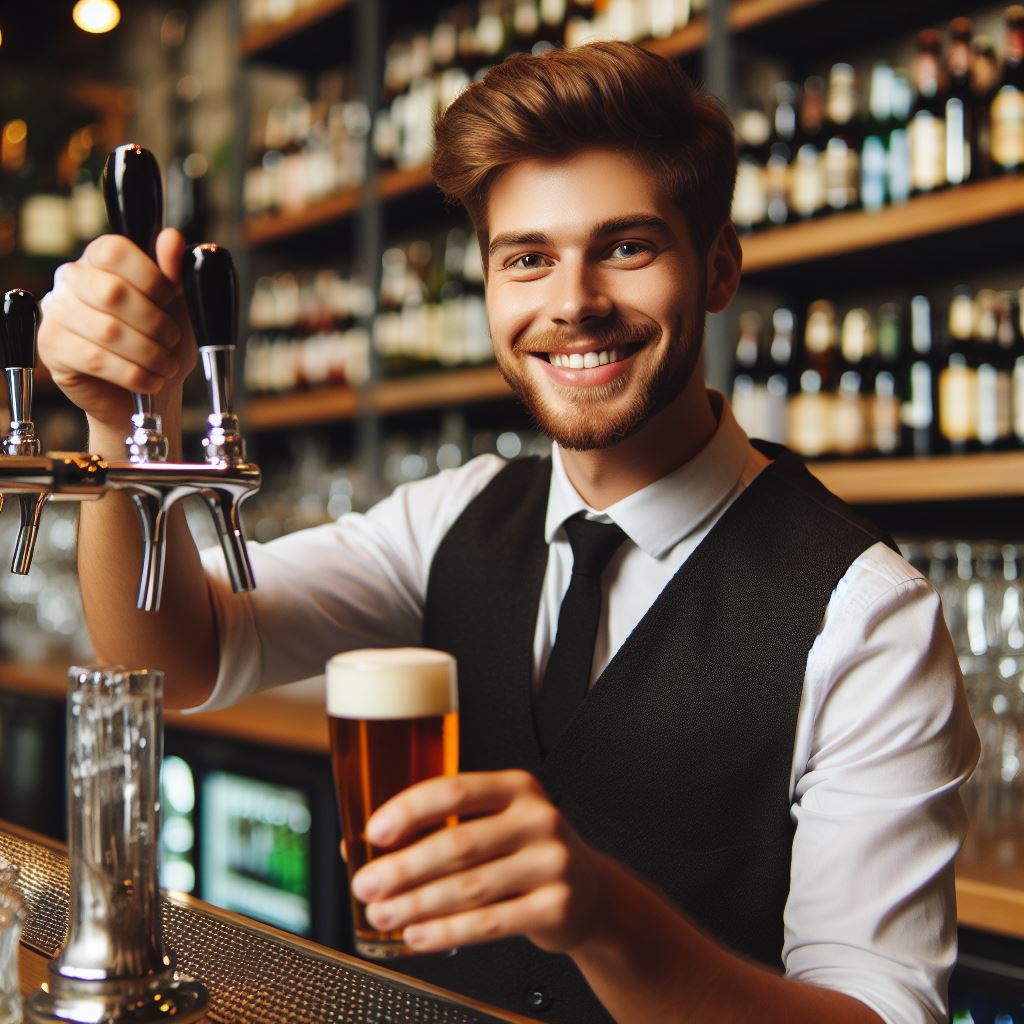Introduction
Bartending has gained popularity as a career choice due to its dynamic nature and potential for growth.
This section explores the opportunities available for building a career in bartending in the UK.
Embarking on a journey to build a thriving career in bartending presents an array of promising opportunities, particularly in the dynamic landscape of the United Kingdom.
As the craft of mixology continues to evolve, this exploration delves into the multifaceted realm of bartending, unraveling the avenues for growth, skill refinement, and professional success within the vibrant tapestry of the UK’s hospitality industry.
From the eclectic cocktail bars of London to the charming pubs nestled in picturesque towns, this guide illuminates the diverse facets of a bartending career, offering insights into the unique challenges, trends, and pathways that define this exhilarating profession on British soil.
Whether you are an aspiring mixologist or a seasoned bartender seeking new horizons, join us on this insightful journey through the exciting and ever-expanding world of bartending in the United Kingdom.
Requirements for becoming a bartender in the UK
A career in bartending can be exciting and rewarding. However, there are certain requirements you need to fulfill in order to pursue this profession in the UK.
Legal age and eligibility to work in the UK
- First and foremost, you need to be of legal drinking age, which is 18 years in the UK.
- Ensure that you have the necessary eligibility to work in the UK, such as a valid work visa.
- Having a good command of the English language is essential as it will be your main means of communication with customers.
Obtaining a Personal License
- If you wish to become a bartender in the UK, you will need to obtain a Personal License.
- The Personal License allows you to sell alcohol legally and work in establishments that serve alcoholic beverages.
- To apply for a Personal License, you must be at least 18 years old and possess the relevant qualifications.
- Applicants must complete a Level 2 Award for Personal License Holders course and pass the associated exam.
- Once you have successfully obtained your Personal License, it is valid for ten years.
Completing relevant training and certifications
- To become a skilled bartender, it is essential to undergo relevant training and acquire certifications.
- Consider enrolling in a bartending course where you will learn techniques, drink recipes, and customer service skills.
- Obtaining a qualification, such as a Level 2 or 3 Diploma in Professional Bartending, can give you an edge in the industry.
- Additionally, gaining certifications in specialized areas like mixology or flair bartending can enhance your resume.
- Regularly attending workshops, seminars, and industry events can also help you keep up with the latest trends and improve your skills.
By fulfilling these requirements, you will be on your way to building a successful career as a bartender in the UK.
Remember, dedication, a passion for mixology, and excellent customer service skills are essential ingredients for success in this dynamic industry.
Read: Health & Safety in UK Bars: A Bartender’s Primer
Exploring different types of bartending jobs in the UK
Traditional pub bartending
- Pub bartending is a popular choice for those who enjoy a lively and sociable atmosphere.
- Responsibilities typically include serving drinks, taking orders, and engaging with customers.
- Traditional pubs evoke a sense of nostalgia and charm, attracting locals and tourists alike.
- It’s an opportunity to learn about different types of beers, ales, and spirits.
- Customer service skills and the ability to work well under pressure are crucial.
Cocktail bartending in upscale establishments
- Cocktail bartending requires creativity, attention to detail, and a deep knowledge of mixology.
- Upscale establishments often have extensive drink menus that bartenders must be familiar with.
- Creating visually stunning and delicious cocktails is a key aspect of this role.
- Flair bartending techniques, such as bottle flipping and juggling, can be showcased in this environment.
- Interacting with customers and providing impeccable service are essential for success in this field.
Bartending in nightclubs and music venues
- Bartending in nightclubs and music venues demands energy, stamina, and the ability to work late nights.
- Fast-paced environments require bartenders to manage crowds while serving drinks efficiently.
- Knowledge of popular club cocktails and shots is crucial to meet the demands of partygoers.
- Working closely with DJs, bouncers, and other staff members is necessary to ensure a smooth operation.
- An understanding of music genres and the ability to create a vibrant atmosphere are important assets.
Read: The Art of Flair Bartending: UK Edition
Education and training opportunities for aspiring bartenders
Bartending courses and schools
- Many bartending courses and schools offer specialized training for aspiring bartenders in the UK.
- These courses provide comprehensive knowledge and skills required to excel in the bartending industry.
- Students learn mixology techniques, customer service, drink recipes, and responsible alcohol serving.
- Reputable schools such as the European Bartender School and the Mixology Group offer certified courses.
- Attending a bartending school not only enhances skills but also boosts employment prospects.
Apprenticeships and on-the-job training
- Apprenticeships are a popular path for individuals looking to become bartenders in the UK.
- This hands-on training allows aspiring bartenders to gain practical experience in real-life bar settings.
- Through apprenticeships, individuals work under the guidance of experienced bartenders, honing their skills.
- Apprenticeships are often offered by pubs, bars, and restaurants, providing valuable industry exposure.
- On-the-job training is also common, where new bartenders learn from more experienced colleagues.
Networking and learning from experienced professionals
- Networking with experienced professionals in the bartending industry can be incredibly beneficial.
- Attending industry events, workshops, and seminars allows aspiring bartenders to connect with key individuals.
- Established bartenders can provide valuable insights and mentorship to help develop a successful career.
- Online platforms such as LinkedIn and professional bartender forums facilitate networking opportunities.
- Learning from experienced professionals helps aspiring bartenders stay updated with industry trends and techniques.
By pursuing bartending courses, apprenticeships, and networking with experienced professionals, aspiring bartenders in the UK can equip themselves with the necessary skills and knowledge to thrive in the industry.
Whether through formal education or on-the-job training, individuals can gain practical experience and learn the art of mixology, customer service, and responsible alcohol serving.
Building a career in bartending requires dedication, passion, and continuous learning to stay competitive and meet the ever-evolving demands of customers.
Thus, investing in education and training opportunities is crucial for individuals who wish to flourish as professional bartenders in the UK.
Personalized UK Career Consulting
Receive tailored career guidance designed just for you. Get actionable steps and expert support to boost your career in 1-3 days. Take control of your career now.
Get StartedRead: UK Bartender Guide: Essential Bar Tools and Uses
Skills and Qualities Required for a Successful Bartending Career
Knowledge of Mixology and Different Types of Drinks
- Bartenders should have a deep understanding of mixology to create unique and delicious cocktails.
- They must be familiar with a variety of spirits, liqueurs, and ingredients used in cocktail recipes.
- Knowledge of different glassware and garnishes is essential to present drinks in an appealing manner.
Customer Service and Communication Skills
- Bartenders must possess excellent customer service skills, offering a friendly and welcoming atmosphere to guests.
- Effective communication is crucial for understanding customers’ drink preferences and accurately taking orders.
- Good listening skills enable bartenders to provide personalized recommendations and address customer queries.
Ability to Work Under Pressure and in a Fast-Paced Environment
- Bartending can be demanding, especially during peak hours when orders come in rapidly.
- Bartenders need the ability to keep calm, stay organized, and efficiently manage multiple drink orders simultaneously.
- Working quickly and accurately is vital to keep up with demanding customers and maintain efficiency.
Problem-Solving and Multitasking Abilities
- Bartenders often encounter unexpected challenges, such as handling difficult customers or resolving service issues.
- They should be adept at finding solutions quickly while maintaining a positive attitude.
- Multitasking is key to bartending success, juggling various tasks like mixing drinks, cash handling, and restocking.
To have a successful bartending career in the UK, acquiring the necessary skills and qualities is crucial.
Knowledge of mixology allows bartenders to create flavorful concoctions, while customer service and communication skills ensure exceptional service.
The ability to handle pressure and work in a fast-paced environment is essential, as is problem-solving and multitasking proficiency.
Developing these skills will not only help bartenders excel but also contribute to their overall job satisfaction.
Read: Salary Insights: What UK Bartenders Really Earn

Job prospects and opportunities for bartenders in the UK
In the UK, the hospitality industry has witnessed significant growth in recent years, providing bartenders with numerous job prospects and opportunities for career advancement.
Growth of the hospitality industry
The hospitality industry in the UK has been booming, with a steady increase in bars, restaurants, and hotels.
- Increased tourism: The rise in tourism has led to a higher demand for skilled bartenders.
- Cultural diversity: The UK’s multiculturalism has resulted in a diverse range of establishments accommodating various tastes.
- Changing consumer preferences: The evolving preferences of consumers have led to the emergence of niche bars and specialty cocktail establishments.
This growth in the hospitality industry creates a multitude of opportunities for bartenders seeking employment.
Different types of establishments to consider
Bartenders in the UK have a wide range of establishments to choose from when building their careers.
- Bars and pubs: Traditional pubs, sports bars, and trendy cocktail bars all provide potential job opportunities.
- Restaurants: Many restaurants have integrated bar areas, allowing bartenders to showcase their skills while serving a variety of drinks.
- Hotels and resorts: Luxury hotels and resorts often employ bartenders to provide exceptional service to their guests.
- Clubs and nightlife venues: Bartenders skilled in mixology and flair can find exciting opportunities in clubs and late-night venues.
Each establishment offers a different atmosphere and customer base, allowing bartenders to explore their preferences and develop their skills accordingly.
Advancement opportunities and potential career paths
Bartending can be more than just a job; it can be a fulfilling career with various advancement opportunities.
- Head bartender: Experienced bartenders can progress to become head bartenders, responsible for managing a bar team and developing signature cocktails.
- Bar manager: Bartenders with strong leadership skills can transition into bar management roles, overseeing operations and staff.
- Consulting and training: Some bartenders expand their careers by offering consulting services or training programs for aspiring bartenders.
- Entrepreneurship: Bartenders with an entrepreneurial spirit can open their own bars or establish mobile bartending businesses.
- Competition and recognition: Bartenders can participate in national and international competitions, gaining recognition and opening doors to new opportunities.
These advancement opportunities allow bartenders to constantly develop their skills, knowledge, and professional network.
In essence, bartenders in the UK have excellent job prospects and various opportunities for career growth in the thriving hospitality industry.
Your Dream Job Starts with a Perfect CV
Get a tailored CV and cover letter that captures your unique strengths and stands out in your industry. Let us help you make an unforgettable first impression.
Get StartedWith the sector’s steady expansion, diverse establishments to choose from, and multiple career paths, bartending can truly be a rewarding profession.
Tips for building a successful bartending career in the UK
Building a diverse skill set
- Attend bartending courses to learn essential techniques and gain knowledge about different alcoholic beverages.
- Practice making a wide range of cocktails, mastering both classic and contemporary recipes.
- Develop excellent customer service skills to provide a memorable experience for patrons.
- Learn how to efficiently multitask and handle stressful situations during busy shifts.
- Acquire knowledge about various types of spirits and their characteristics to suggest suitable drinks to customers.
Networking and making industry connections
- Participate in bartender competitions and events to meet professionals and showcase your skills.
- Join industry organizations and attend networking events to connect with other bartenders and potential employers.
- Utilize social media platforms to build your online presence and connect with industry influencers.
- Collaborate with local breweries, distilleries, and beverage suppliers to expand your network.
- Stay in touch with former coworkers and employers who can provide references and job opportunities.
Continuing education and staying updated on industry trends
- Attend workshops, seminars, and conferences to stay up-to-date with the latest trends and techniques in bartending.
- Subscribe to industry publications and follow influential bartenders on social media to stay informed.
- Take courses on mixology, wine pairing, and brewery operations to enhance your knowledge and expertise.
- Experiment with new ingredients, flavors, and presentation styles to create unique and innovative cocktails.
- Stay informed about changing regulations and licensing requirements in the UK’s hospitality industry.
By building a diverse skill set, networking with industry professionals, and staying updated on industry trends, you can truly enhance your bartending career in the UK.
It’s not just about pouring drinks; it’s about creating memorable experiences, making connections, and continuously growing as a professional.
Keep practicing, learning, and building your reputation within the bartending community, and success will follow.
Challenges and potential drawbacks of a career in bartending
Irregular working hours and late nights
- Bartenders often work irregular hours, including late nights, weekends, and holidays.
- The unpredictable schedule can make it difficult to maintain a work-life balance.
- It may require sacrificing personal time and missing out on social events.
- Late nights can lead to fatigue and impact overall well-being.
- These factors can strain personal relationships and make bartending a challenging career choice.
Dealing with demanding customers or difficult situations
- Bartenders frequently encounter demanding customers who expect quick and exceptional service.
- Difficult situations may arise, including handling conflicts, unruly behavior, and confrontations.
- Maintaining professionalism and composure in these situations is crucial.
- It requires excellent communication and problem-solving skills.
- Dealing with challenging customers or difficult situations can be emotionally draining.
Physical demands and health considerations
- Bartending is a physically demanding profession that requires long periods of standing and moving.
- It can lead to tiredness, muscle strains, and various physical discomforts.
- Bartenders often work in environments with loud music and crowded spaces, affecting their hearing.
- Exposure to alcoholic beverages and second-hand smoke can pose health risks.
- Maintaining overall health, including proper nutrition and sleep, is important to cope with physical demands.
Throughout a bartending career, these challenges and potential drawbacks should be considered.
However, with the right mindset, dedication, and passion for the profession, individuals can overcome these hurdles and find success in the bartending industry.
It is crucial to develop effective coping strategies, establish boundaries, and prioritize self-care to maintain a fulfilling career in bartending.
Conclusion
We explored bartending opportunities in the UK—diverse, dynamic, and rewarding.
In this blog post, we also discussed several key points about building a career in bartending in the UK.
Embrace exciting UK bartending opportunities. Develop essential skills, from mixology to customer service.
Considering bartending as a potential career option in the UK can open up exciting opportunities.
Bartending as a fulfilling career choice in the UK’s thriving hospitality industry.
Consider bartending as a promising career path in the UK’s thriving hospitality industry.
Pursuing a bartending career can bring you potential rewards and personal fulfillment.
Optimize Your LinkedIn for Success
Boost your LinkedIn profile with a professional bio, keyword-rich headline, and strategic recommendations that attract recruiters. Stand out from the crowd and get noticed.
Optimize NowEnjoy financial stability, networking, and creative satisfaction. A bartending career offers both personal and professional fulfillment.
Enjoy lucrative earnings, build a social network, and experience personal growth through bartending.
[E-Book for Sale]
500 Cutting-Edge Tech Startup Ideas for 2024 & 2025: Innovate, Create, Dominate
$19.99 • 500 Tech Startup Ideas • 62 pages
You will get inspired with 500 innovative tech startup ideas for 2024 and 2025, complete with concise descriptions to help you kickstart your entrepreneurial journey in AI, Blockchain, IoT, Fintech, and AR/VR.




